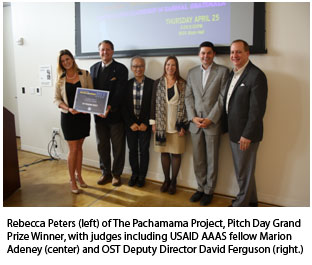 The lack of water, sanitation, and hygiene (WASH) programs that take into account menstrual hygiene and management (MHM) creates asymmetrical negative impacts on women and girls. The Pachamama Project is the first MHM initiative of its kind in Mexico and Bolivia and builds on the successes and challenges encountered during its initial fieldwork and on previous health focused research efforts on MHM. MHM will not become a priority for gender, water, and rights concerns unless researchers and practitioners make deliberate efforts to mainstream MHM into human rights and WASH based initiatives. By framing MHM as a human rights issue, the Pachamama Project taps into larger discourses of justice and gender equality instead of sidelining MHM from the global water, sanitation, and hygiene development agenda. By fostering community discussion, education, and participation in MHM activities, the Pachamama Project will enable structural change on the communities’ terms, while broadening understandings of the human rights connection to water, sanitation, and gender equity.
The lack of water, sanitation, and hygiene (WASH) programs that take into account menstrual hygiene and management (MHM) creates asymmetrical negative impacts on women and girls. The Pachamama Project is the first MHM initiative of its kind in Mexico and Bolivia and builds on the successes and challenges encountered during its initial fieldwork and on previous health focused research efforts on MHM. MHM will not become a priority for gender, water, and rights concerns unless researchers and practitioners make deliberate efforts to mainstream MHM into human rights and WASH based initiatives. By framing MHM as a human rights issue, the Pachamama Project taps into larger discourses of justice and gender equality instead of sidelining MHM from the global water, sanitation, and hygiene development agenda. By fostering community discussion, education, and participation in MHM activities, the Pachamama Project will enable structural change on the communities’ terms, while broadening understandings of the human rights connection to water, sanitation, and gender equity.
- ,
- , 150th Graphic
The Pachamama Project (UC Berkeley)
Facebook
Twitter
LinkedIn
More Winners
The Biodiesel Project (UC Berkeley)
The goal of the Biodiesel Project is to provide UC Berkeley with a sustainable means of acquiring biodiesel as a cleaner, alternative energy source for
April 20, 2015
Farmview: New Power for Tenant Farmers (UC Berkeley)
In California, just as low-income residents struggle to find affordable housing, farmers also face a cutthroat farmland rental market. If beginning farmers can’t find land
June 15, 2017
PedalTap: A Retrofittable, Affordable Hands Free Foot Operated Water Dispensing System (Makerere University)
In Uganda, the most common type of water tap is manual, requiring a user to open and close it with their hand. If the tap
June 15, 2017
The Somo Project (UC Berkeley)
The Somo Project’s mission is to identify, train, fund and mentor entrepreneurs looking to drive social change by building enterprises in their own low-income urban
April 20, 2015

